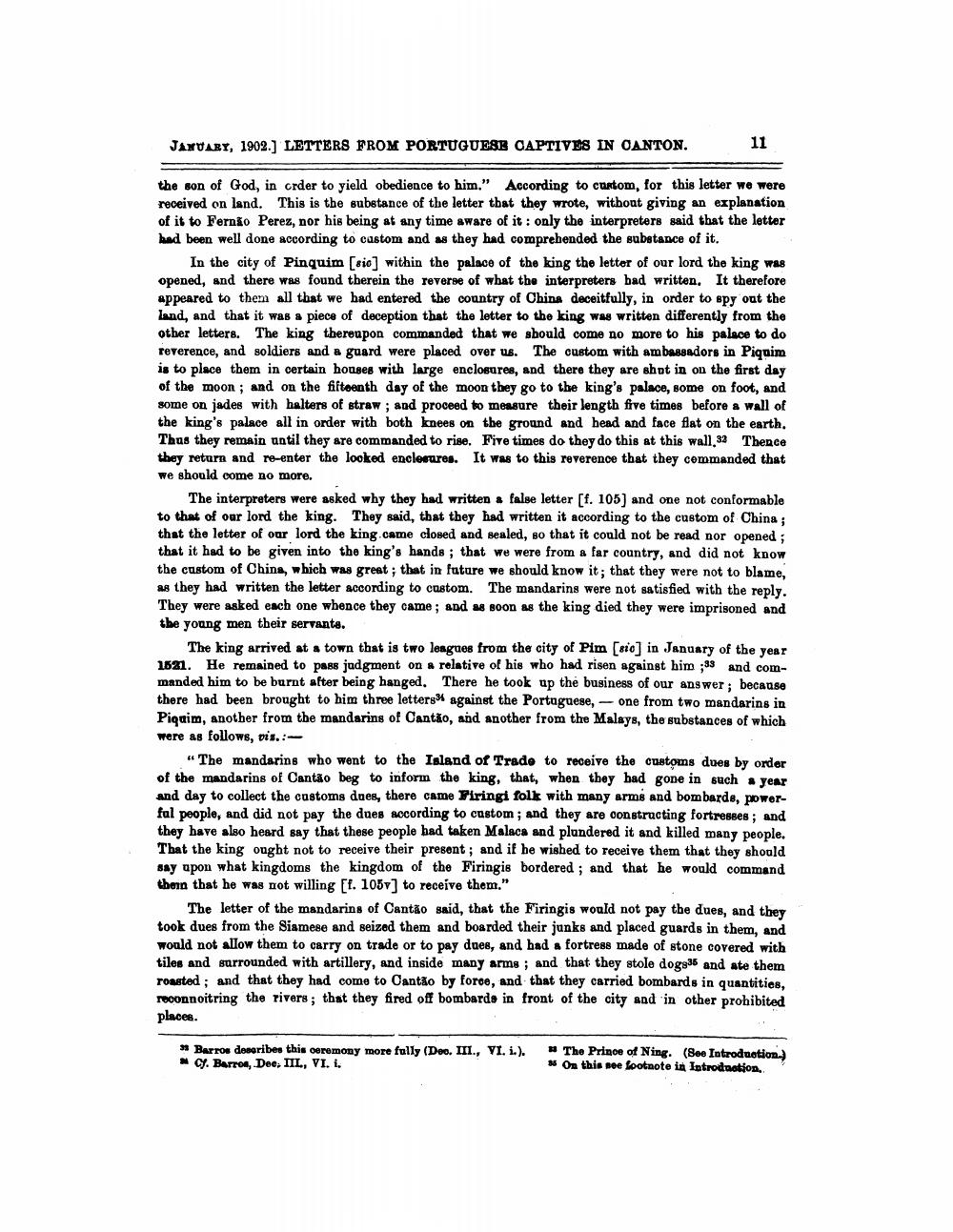________________
JANUARY, 1902.) LETTERS FROM PORTUGUESE CAPTIVES IN OANTON.
the son of God, in crder to yield obedience to him." According to custom, for this letter we were received on land. This is the substance of the letter that they wrote, without giving an explanation of it to Fernão Perez, nor his being at any time aware of it : only the interpreters said that the letter had been well done according to custom and as they had comprehended the substance of it.
In the city of Pinquim [sic] within the palace of the king the letter of our lord the king was opened, and there was found therein the reverse of what the interpreters bad written. It therefore appeared to them all that we had entered the country of China deceitfully, in order to spy out the land, and that it was a piece of deception that the letter to the king was written differently from the other letters. The king thereupon commanded that we should come no more to his palace to do reverence, and soldiers and a guard were placed over us. The custom with ambassadors in Piquim is to place them in certain houses with large enclosures, and there they are shot in on the first day of the moon; and on the fifteenth day of the moon they go to the king's Palace, some on foot, and some on jades with halters of straw; and proceed to measure their length five times before a wall of the king's palace all in order with both knees on the ground and head and face flat on the earth. Thus they remain until they are commanded to rise. Five times do they do this at this wall.32 Thence they return and re-enter the looked enclosures. It was to this reverence that they commanded that we should come no more.
The interpreters were asked why they had written a false letter (f. 105) and one not conformable to that of our lord the king. They said, that they had written it according to the custom of China; that the letter of our lord the king.came closed and sealed, so that it could not be read nor opened; that it had to be given into the king's hands; that we were from a far country, and did not know the custom of China, which was great ; that in future we should know it; that they were not to blame, as they had written the letter according to custom. The mandarins were not satisfied with the reply. They were asked each one whence they came; and as soon as the king died they were imprisoned and the young men their servants.
The king arrived at a town that is two leagues from the city of Pim [s10] in January of the year 162. He remained to pass judgment on a relative of his who had risen against him ; 89 and commanded him to be burnt after being hanged. There he took up the business of our answer; because there had been brought to him three letters4 against the Portuguese, - one from two mandarins in Piquim, another from the mandarins of Cantão, and another from the Malays, the substances of which were as follows, vis.
"The mandarins who went to the Island of Trade to receive the customs dues by order of the mandarins of Cantão beg to inform the king, that, when they had gone in such a year and day to collect the customs dues, there came Firingi folk with many arms and bombarde, powerfal people, and did not pay the dues according to custom; and they are constructing fortresses; and they have also beard say that these people had taken Malaca and plundered it and killed many people. That the king ought not to receive their present; and if he wished to receive them that they should say upon what kingdoms the kingdom of the Firingis bordered ; and that he would command then that he was not willing ff. 105v] to receive them."
The letter of the mandarins of Cantão said, that the Firingis would not pay the dues, and they took dues from the Siamese and seized them and boarded their junks and placed guards in them, and would not allow them to carry on trade or to pay dues, and had a fortress made of stone covered with tiles and surrounded with artillery, and inside many arms; and that they stole dogg36 and ate them roasted ; and that they had come to Cantão by force, and that they carried bombards in quantities, reconnoitring the rivers; that they fired off bombarde in front of the city and in other prohibited places.
» Barros donoribes this ceremony more fully (Deo. III., VI...). * C. Barros, Dee, IIL, VI. i.
The Prince of Ning. (See Introduction.) * On this see footnote in Introduction.




